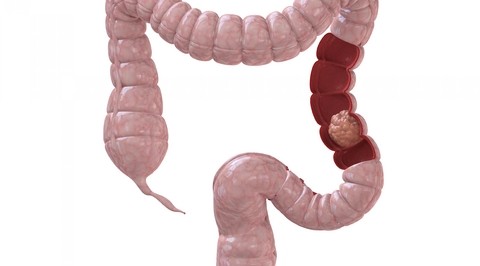Colorectal cancer is a cancer of the lower intestine, which generally occurs after age 50. The disease can be further defined into colon cancer or rectal cancer, if the growth is in the last six inches of bowel. Unfortunately, colorectal cancers are fairly common, with 112,000 new colon cancers, and 41,000 new rectal cancers diagnosed annually. Colorectal cancers together are responsible for more than 50,000 deaths per year, although with proper screening, this number is steadily declining.
Risk factors for developing colorectal cancer include smoking, age, irritable bowel syndrome and family history of colorectal cancer. In addition, a diet rich in red meat in low in vegetables, fruits and fiber are believed to contribute to the likelihood of developing colorectal cancers. A sedentary lifestyle and excessive alcohol consumption are also believed to contribute to development of colorectal cancers.
Colorectal cancers develop slowly, over a period of several years. The symptoms of this disease may be subtle, or may not be present at all. As the disease advances, the symptoms become more pronounced, and include a change in bowel habit (constipation or diarrhea), a change in the diameter of the stool, increased gas, and abdominal pain. Although bleeding is indicative of several diseases of the lower intestine, it may also be associated with rectal cancers. Larger tumors may result in bowel obstruction.
More than 95% of all colorectal cancers start as adenomatous polyps, which produce few symptoms. Generally, polyps are non-cancerous, but as they continue to grow, they can develop into invasive cancers. These polyps can be easily removed during routine colonoscopies, before they develop into invasive disease.
Several screening procedures for colon cancer exist. Non-invasive measures include the fecal occult blood test. This screening test checks for blood in your stool, and is performed at home. Although bleeding can be associated with cancer, other disorders can also cause intestinal bleeding, so it is very important to follow up the results of this test with your physician.
The barium enema is another examination that can be performed for colorectal cancer screening. In this test, the physician can evaluate the entire large intestine by x-ray after the application of a barium enema. Although this is a useful examination, it does have a high rate of missing lesions in the colon. Further, any lesions that are seen will require an additional procedure for removal of the growth.
The best screening procedure by far is the flexible colonoscopy that should be performed at age 50. In this procedure, the doctor inserts a long, slender, flexible tube into the rectum, and can visualize the inside of the colon through a small camera. You will be required to drink a large amount of fluid which will empty the colon prior to this procedure. You will also receive sedation prior to the procedure. During the colonoscopy, the doctor can easily visualize any polyps, and remove them with a device that is attached to the instrument. Removal of these polyps in the early stages will prevent them from developing into invasive cancer. Further, if the doctor does visualize a polyp that is suspicious for having developed into cancer, the doctor can take a biopsy during the colonoscopy. Failure to offer the colonoscopy procedure to patients over age 50, or those with a family history of colon cancer may be considered medical malpractice. This procedure should be repeated every 5-10 years, upon the advice of your physician.
If colorectal cancer is detected, a biopsy can determine the stage of the cancer. In general, surgery is the best option for localized cancers. This may or may not be followed by chemotherapy. Radiation is generally not used to treat colon cancers, but is commonly used to treat cancers localized to the rectum. As with any cancer, the earlier the detection, generally, the better the outcome.
As colorectal cancers grow, they tend to spread to the abdominal lymph nodes, and other organs, most frequently the liver. Once the cancer has spread, survival rates decrease. Early detection is key in prevention and treatment of colorectal cancers.






